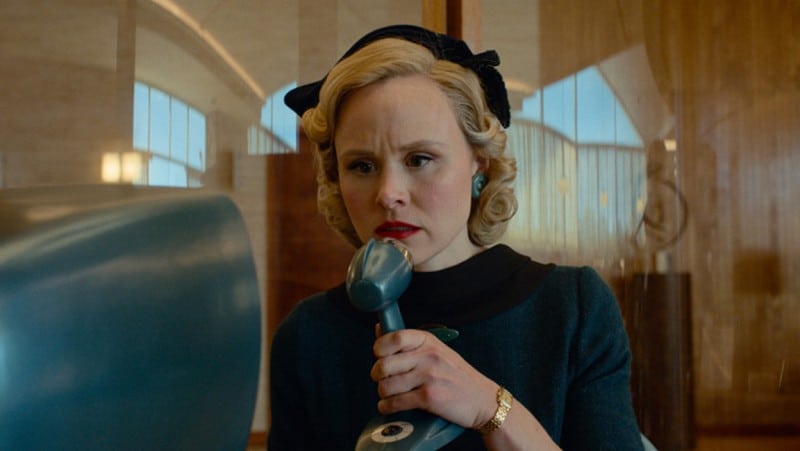
When I was a kid, I used to pore over the “Futures” issue of one of my favorite magazines. Its premise was simple: here’s what the future might look like. But for every guess it got right, like smartphones or electric cars, it got something dead wrong: jet packs, food in pills, or all-digital walls in our homes. Each attempt to capture the future, I eventually realized, turns out to be a time capsule of the past, too. The new Apple TV+ series Hello Tomorrow, a stylish-but-slight retrofuturistic sci-fi show, builds its world in that strangely magical place between the future and past. The result is a strange, somewhat unsatisfying show that nonetheless is capable of capturing viewers’ attention.
Hello Tomorrow (or Hello Tomorrow! as it’s officially stylized) stars Billy Crudup of The Morning Show and Almost Famous fame. Crudup plays Jack, a slick, successful salesman for a company called BrightSide, which aims to get everyday people living their best lives on the moon. In this world, which is itself otherworldly in its never-explained mash-up of 1960s aesthetics and clunky-yet-advanced technology, there’s no pressing political or cultural reason for humans to move to the moon. Rather, it’s a luxury lifestyle, sold door-to-door like timeshares or Avon makeup.
Of course, most of us know better than to trust a traveling salesman. Jack’s thin smile and near-pathological inability to take no for an answer seem to hint from the start that BrightSide might not be putting a price tag on the perfect American dream after all. Much of the series’ ten-episode first season explores the fraught layers of truth and deception within Jack’s business, painting a broad if not particularly deep portrait of the pitfalls and magnetic pull of capitalism. Hello Tomorrow is full of shiny-eyed nobodies living on a dream, idiosyncratic admen selling the moon, and people of all stripes who have trouble telling each other the whole truth.
Jack heads up the BrightSide sales team, a group that also includes Hank Azaria’s gambler Eddie, Haneefah Wood’s receptive second-in-command Shirley, Dewshane Williams’ uber-polite company man Herb, and a newcomer with a secret connection to Jack, Joey (Nicholas Podany). When the show’s premise wears thin, its cast at least rises to the occasion, with Wood as a clear standout of the bunch and great supporting turns from a gamely intense Allison Pill (as a woman who gives up everything for a spot on the moon) and sweetly funny Matthew Maher (Our Flag Means Death’s Black Pete, here playing a bureaucratic investigator).
Unfortunately, though, Hello Tomorrow does wear thin throughout. Though the show comes from an original idea, it has the distinct flavor of a novella, or short story adaptation stretched beyond the limitations of its plot. The show builds its quirky world well but takes its sweet time assembling any real story and often feels a little too shapeless to really take off. It’s not quite emotional enough to feel like a drama, but it’s also not overtly funny. Mostly, Hello Tomorrow feels like a mildly entertaining novelty with enough secrets up its sleeve to keep viewers watching.
But at least the show has some pretty stylish sleeves. On an art design and production level, Hello Tomorrow is a triumph. It imagines a weird world in which women can cross the street in mobile, hovering salon chairs while Amazon-like delivery trucks are driven by friendly virtual birds. The show possesses a unique and endlessly interesting style that calls to mind a place like Disney’s Tomorrowland, a vision of the 21st century imagined during a post-war era – when Jello was the base of the food pyramid and people worried more about radio waves than cigarette smoke.
The intricacies of this world’s relationship with technology are intriguingly contradictory, as when characters leave video messages for one another on grainy, old-fashioned TV sets. These details seem inexplicable by design, though, and they’re a whimsical joy to behold, especially with The End of the F***ing World director Jonathan Entwhistle’s assured filmmaking eye. With off-kilter characters, a retro sheen, and a sense of light absurdity, Hello Tomorrow sometimes seems to share a bit of creative DNA with better projects that have nothing to do with it, like Netflix’s A Series of Unfortunate Events.
This show is never as clever nor as emotionally potent as that one was, though. While it seems interested in some meaningful themes – worthiness and existential ennui among them – they’re so latent within the show’s scripts that they may as well be on the far side of the moon. Mostly, it comes across as a speculative fiction trifle that’s an awful lot of fun to look at.
Related Topics: Apple TV+

